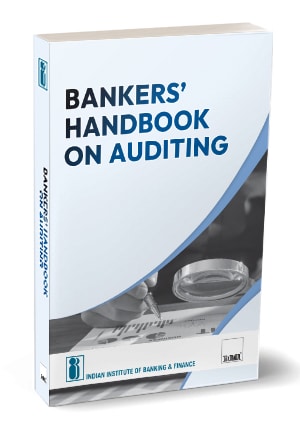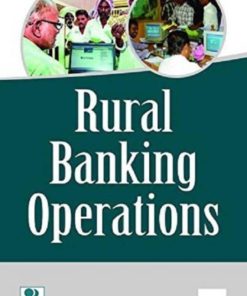- Binding : Paperback
- Publisher : Taxmann Publications Pvt. Ltd
- Author : Indian Institute of Banking & Finance (IIBF)
- Edition : January 2024
- Language : English
- ISBN-10 : 9789357785990
- ISBN-13 : 9789357785990
Taxmann’s Bankers’ Handbook on Auditing By IIBF
₹1,075.00
Taxmann’s Bankers’ Handbook on Auditing By IIBF. This book offers an exhaustive discussion of banking sector audits. It discusses diverse bank audit types, risk management strategies, and integrating digital advancements in bank auditing practices. This handbook serves as a crucial guide, illuminating the confluence of auditing and accounting with regulatory adherence in the banking industry, emphasising practical application and current digital trends.
10 in stock
Taxmann’s Bankers’ Handbook on Auditing By IIBF.
Taxmann’s Bankers’ Handbook on Auditing By IIBF.
Description :-
The Bankers’ Handbook on Auditing was developed to address the most important aspects of bank auditing. It underscores the interlinkage and importance of an organisation’s robust accounting and auditing systems.
The focus area of this handbook revolves around the following:
- Introduction & Types of Audit
- Internal Audit
- Audit in a Computerised Environment
- Audit Aspects of Financial Statements of Banks
This book aligns with regulatory compliance and operational efficiency, especially in bank accounting and audit functions. The current edition has also been updated based on banking experts and internal faculty feedback, focusing on practicality and current digital trends.
The Present Publication is the 2024 Edition, updated by Mr Sampath Kumar K S, CA (Former Deputy General Manager – Indian Overseas Bank) and vetted by Mr Anil B Rane, B.Com. & LLB (Former General Manager – Bank of India). Taxmann exclusively publishes this book for the Indian Institute of Banking and Finance with the following coverage:
- Introduction & Types of Audit – This section provides an overview of the evolution, definition, and importance of auditing, exploring various audit types along with their scope, objectives, and limitations. It distinguishes between auditing, accounting, and investigation, laying a foundational understanding for readers
- Bank Audit & Types – Focusing on the banking sector, this part delves into the significance of risk-based internal audits and provides a detailed examination of different types of bank audits, including concurrent, internal, and statutory audits
- Risk-Based Supervision (RBS) – The book examines the objectives, focus, and reasons for adopting Risk-Based Supervision in banking. It discusses supervisory tools, the SPARC framework, and provides insights into the Risk Discovery Process and the IRISc Model
- Internal Audit’s Role in Governance – This section traces the evolution and the multifaceted roles of internal audit, emphasising its crucial role in corporate governance
- Risk-Based Internal Audit in Banks – Here, the book explains the concept of risk-based auditing and its practical implementation in banks, including guidelines, standards, and ethics set by the RBI and MOF
- Risk-Based Internal Audit Procedures – Offering an in-depth look at internal audit processes, this part focuses on audit prioritisation, reporting, and strategies for tackling auditing challenges
- Risk Management – It defines and discusses the relationship between internal auditing and risk management, covering the architecture of risk management and the auditor’s role in this context
- Data Analytics and Continuous Controls Monitoring – The section highlights the use of data analytics in business and audit decisions and outlines the techniques and benefits of continuous controls monitoring and auditing
- Audit in Computerised Information System (CIS) Environment – This part provides an understanding of the CIS environment and its impact on auditing, including an examination of auditing standards and approaches relevant to CIS
- Audit in a Computerised Environment – An analysis of how computer systems affect internal control, along with a review of RBI guidelines for IS audit and risk management in such environments
- Audit Aspects of Advances – The book examines advances reflected in balance sheets, including audit procedures and coverage of agricultural advances, NPA norms, and loan document reviews
- Audit Aspects of Financial Statements | Assets Side – An overview of disclosure requirements and balance sheet analysis, focusing on assets like fixed assets and other assets, along with their audit procedures
- Audit Aspects of Capital, Reserves, Borrowings, & Deposits – This part presents a detailed analysis of capital, reserves, and surplus in financial statements, including audit approaches and procedures for borrowings and deposits
- Audit Aspects of Other Liabilities & Provisions – Examination of other liabilities, provisions, and contingent liabilities, along with a review of bills for collection and associated audit approaches
- Audit Aspect of Treasury Operations – Insights into treasury operations, including forex and derivative transactions, and an understanding of investments, CRR, SLR requirements, and audit procedures
- Audit Aspects of Profit and Loss Account – This section covers the preparation and disclosure in the profit and loss account, detailing audit procedures for income and expenditure
- Disclosure Requirements in Financial Statements – Highlights the importance and classification of disclosures in financial statements and the requirements of statutes and listing agreements
- Audit Aspects of Consolidation of Branch Accounts – Discusses the process and approach to the consolidation of financial statements at various levels, including overseas branches
- Audit Aspects of Consolidation of Financial Statements – Guidelines on consolidated accounting and supervision, and components and audit procedures for consolidated financial statements
- Audit Aspect of Inter-Office Transactions – An overview of major transactions and errors in inter-branch transactions, along with audit approaches and procedures for these transactions
- Long Form Audit Report of Bank Branches – Definition, purpose, and steps in dealing with LFAR, including guidelines and important aspects for branch statutory auditors
- Long Form Audit Report of Head Office – Coverage and audit aspects of LFAR at the head office level, including the implementation of committee and RBI recommendations
- Basel III Regulations and Disclosures – An overview of Basel III norms and the disclosure framework, along with the role of auditors in ensuring compliance with these regulations
- Database Security Audit – Exploration of database security and audit principles, focusing on audit techniques, security authentication, and audit trails
- Remote Auditing – Understanding remote auditing, its advantages, limitations, and ISO guidelines, along with RBI/ICAI guidelines on remote auditing
The detailed contents of this book are as follows:
- Module A – Introduction and Types of Audit
- Introduction to Auditing and Types of Audit
- Bank Audit and Various Types of Audit in Banks
- Risk-Based Supervision – A New Approach
- Module B – Internal Audit
- Internal Audit – Role in Overall Governance
- Risk-based Internal Audit in Banks
- Risk-Based Internal Audit Procedures
- Risk Management
- Data Analytics and Continuous Controls Monitoring
- Module C – Audit in Computerised Environment
- Audit in Computerised Information System (CIS) Environment – An Introduction
- Audit in a Computerised Environment
- Module D – Audit Aspects of Financial Statements of Banks
- Audit Aspects of Advances
- Audit Aspects of Bank’s Financial Statements – Assets Side (Other than Advances)
- Audit Aspects of Capital, Reserves & Surplus and Borrowings & Deposits
- Audit Aspects of Other Liabilities & Provisions and Contingent Liabilities
- Audit Aspect of Treasury Operations – Forex & Derivative Transactions
- Audit Aspects of Profit and Loss Account
- Disclosure Requirements in Financial Statements
- Audit Aspects of Consolidation of Branch Accounts
- Audit Aspects of Consolidation of Financial Statements
- Audit Aspect of Inter-Office Transactions
- Long Form Audit Report of Bank Branches
- Long Form Audit Report of Head Office/Central Office
- Basel III Regulations and Disclosures
- Database Security Audit
- Remote Auditing













Reviews
There are no reviews yet.